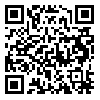BibTeX | RIS | EndNote | Medlars | ProCite | Reference Manager | RefWorks
Send citation to:
URL: http://irj.uswr.ac.ir/article-1-419-fa.html
Objectives: The most common problem that delinquent children and juveniles deal with at every moment is the lack of sufficient control over their aggression. Accordingly, the aim of this study is to investigate the effects of mental rehabilitation group therapy based on acceptance and commitment on decreasing aggression in juvenile delinquents.
Methods: This study employed a quasi-experimental method with a pretest-post-test design and a 2-month follow-up with both the experimental and the control group. To conduct this study, 30 cases of delinquent juveniles were selected by the Buss and Perry Aggression Questionnaire, and randomly assigned to two experimental and control groups. The Experimental group received 8 sessions of acceptance and commitment group therapy.
Results: Results were analyzed using ANOVA, and showed that the experimental group demonstrated a significant reduction in aggression and its aspects (physical aggression, verbal aggression, anger and hostility) compared with the control group. This difference was also maintained in the follow-up phase (P<0.001).
Discussion: The results showed that acceptance and commitment group therapy can effectively reduce overall aggression and its dimension (physical aggression, verbal aggression, anger and hostility), and that the results last to the follow-up phase.
دریافت: 1394/1/23 | پذیرش: 1394/2/27 | انتشار: 1394/3/11



